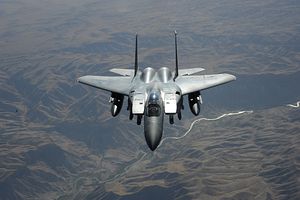The Taiwanese Ministry of National Defense has categorically denied a report that the United States had raised the possibility of leasing Boeing F-15C/D Eagle fighters to the Republic of China Air Force (ROCAF).
There has been no proposal of the sort from the United States, Taiwanese Ministry of Defense spokesman Major General Chen Chung-chi noted in a statement, carried by the Taipei Times. Maj. Gen. Chen called the report on the supposed lease proposal, carried by the Chinese-language UpTimes, to be “pure speculation by the media.”
The report emerged shortly after a pointed warning by Chinese President Xi Jinping that any attempts to split China were “doomed to fail” in a speech before the National People’s Congress in Beijing. China considers Taiwan part of its territory. Relations across the Taiwan strait have declined since the May 2016 inauguration of President Tsai Ing-wen.
Moreover, the report emerged just weeks after U.S. President Donald Trump signed into law the Taiwan Travel Act in the United States, drawing criticism from Beijing. Meanwhile, U.S. Deputy Assistant Secretary of State for East Asian and Pacific Affairs Alex Wong arrived in Taipei for a pre-planned trip. (The trip was unrelated to the Taiwan Travel Act.)
Taiwanese President Tsai Ing-wen welcomed the Taiwan Travel Act earlier this month as well. Following Xi’s speech, China sent its lone operational aircraft carrier strike group to traverse the Taiwan Strait. The ROCAF scrambled fighters to track the movements of the People’s Liberation Army-Navy vessels through the Taiwan Strait.
The ROCAF currently has three core types of combat-capable fighter aircraft, including three squadrons of Dassault Mirage 2000-5E/D fighters, three squadrons of F-5E/F/ Tiger IIs, six squadrons of F-16 Block A and Block B Fighting Falcons, and 5 squadrons of the indigenously built F-CK-1 Ching-kuo fighters.
An F-15C/D Eagle would complement the capabilities currently offered to the ROCAF by the Mirage 2000, which is an aging platform. Taiwan’s Aerospace Industrial Development Corp, the country’s leading indigenous military aviation firm, is upgrading the country’s existing F-16A/B fleet in cooperation with Lockheed Martin.
Last year, the Trump administration authorized the first major arms package for Taiwan since 2015. The package last year included AGM-88B missiles, SM-2 Block IIIA missiles, the MK48 Mod 6AT heavyweight torpedo, the MK54 lightweight torpedo, the AGM-154C joint standoff weapon, and AN/SLQ-32(V)3 electronic warfare systems.
China’s total spending on defense continues to significantly dwarf Taiwan’s; Beijing’s 2017 defense budget was 14 times as large as Taiwan’s. The Taiwanese government is spending $11 billion on defense in 2018.

































